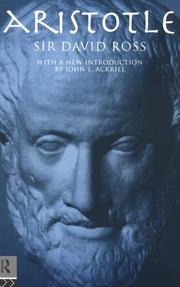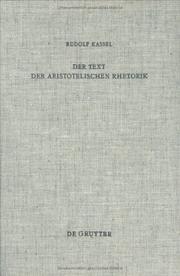| Listing 1 - 10 of 815 | << page >> |
Sort by
|

ISBN: 348712565X 3487125668 Year: 2004 Volume: 237 Publisher: Hildesheim : Georg Olms,
Abstract | Keywords | Export | Availability | Bookmark
 Loading...
Loading...Choose an application
- Reference Manager
- EndNote
- RefWorks (Direct export to RefWorks)
Book
ISBN: 3896653563 Year: 2005 Volume: 4 Publisher: Sankt Augustin : Academia Verlag,
Abstract | Keywords | Export | Availability | Bookmark
 Loading...
Loading...Choose an application
- Reference Manager
- EndNote
- RefWorks (Direct export to RefWorks)

Abstract | Keywords | Export | Availability | Bookmark
 Loading...
Loading...Choose an application
- Reference Manager
- EndNote
- RefWorks (Direct export to RefWorks)
Book
ISBN: 9783110679786 Year: 2020 Publisher: Berlin : De Gruyter,
Abstract | Keywords | Export | Availability | Bookmark
 Loading...
Loading...Choose an application
- Reference Manager
- EndNote
- RefWorks (Direct export to RefWorks)
The philosophical and philological study of Aristotle fragments and lost works has fallen somewhat into the background since the 1960’s. This is regrettable considering the different and innovative directions the study of Aristotle has taken in the last decades. This collection of new peer-reviewed essays applies the latest developments and trends of analysis, criticism, and methodology to the study of Aristotle’s fragments. The individual essays use the fragments as tools of interpretation, shed new light on different areas of Aristotle philosophy, and lay bridges between Aristotle’s lost and extant works. The first part shows how Aristotle frames parts of his own understanding of Philosophy in his published, 'popular' work. The second part deals with issues of philosophical interpretation in Aristotle’s extant works which can be illuminated by fragments of his lost works. The philosophical issues treated in this section range from Theology to Natural Science, Psychology, Politics, and Poetics. As a whole, the book articulates a new approach to Aristotle’s lost works, by providing a reassessment and new methodological explorations of the fragments.
Book
ISBN: 9789608591523 960859152X Year: 2003 Publisher: Athens : Societyf for Aristotelian studies "The Lyceum",
Abstract | Keywords | Export | Availability | Bookmark
 Loading...
Loading...Choose an application
- Reference Manager
- EndNote
- RefWorks (Direct export to RefWorks)
Book
ISBN: 0415148847 041514888X 0415148863 0415148871 0415148855 9780415148870 9780415148856 9780415148887 9780415148863 9780415148849 Year: 1999 Publisher: London ; New York, NY : Routledge,
Abstract | Keywords | Export | Availability | Bookmark
 Loading...
Loading...Choose an application
- Reference Manager
- EndNote
- RefWorks (Direct export to RefWorks)
Aristotle --- Aristotle.

ISBN: 3110037408 9783110037401 Year: 1971 Volume: 3 Publisher: Berlin ; New York, NY : Walter de Gruyter,
Abstract | Keywords | Export | Availability | Bookmark
 Loading...
Loading...Choose an application
- Reference Manager
- EndNote
- RefWorks (Direct export to RefWorks)
Book
ISBN: 389665330X Year: 2004 Volume: 21 Publisher: Sankt Augustin Academia-Verl.
Abstract | Keywords | Export | Availability | Bookmark
 Loading...
Loading...Choose an application
- Reference Manager
- EndNote
- RefWorks (Direct export to RefWorks)
Plato. --- Aristotle --- Aristotle.
Book
ISBN: 9781438476841 9781438476858 9781438476865 1438476868 143847685X Year: 2019 Publisher: Albany, N.Y. Suny Press
Abstract | Keywords | Export | Availability | Bookmark
 Loading...
Loading...Choose an application
- Reference Manager
- EndNote
- RefWorks (Direct export to RefWorks)
On the basis of careful textual exegesis and philosophical analysis, and contrary to the received view, Mark R. Wheeler demonstrates that Aristotle presents and systematically explicates his definition of the essence of the truth in the Metaphysics. Aristotle states the nominal definitions of the terms "truth" and "falsehood" as part of his arguments in defense of the logical axioms. These nominal definitions express conceptions of truth and falsehood his philosophical opponents would have recognized and accepted in the context of dialectical argument. On the basis of these nominal definitions, Aristotle develops his definitions of the essences of truth and falsehood--his "real" definitions of truth and falsehood. Aristotle's methodical exposition of his essential definitions of truth and falsehood in the Metaphysics serves as a well-developed example of how his philosophical inquiry starts with nominal definitions and ends with real definitions. Wheeler also argues for the novel claim that Aristotle defines the most fundamental kind of truth in terms of accurate measurement. Aristotle's metrical conception of truth serves as the theoretical basis for specifying the truth conditions of various assertions, for identifying the sorts of beings implicated in these truth conditions, and for explaining the nature of approximate truth and falsehood. Far from offering us a minimal account of truth, Wheeler shows how Aristotle offers us a sophisticated and metrical theory of truth.
Truth. --- Aristotle. --- Metaphysics --- Aristotle
Book
ISBN: 9783825361648 3825361640 Year: 2013 Volume: 51 Publisher: Heildelberg : Universitätsverlag Winter,
Abstract | Keywords | Export | Availability | Bookmark
 Loading...
Loading...Choose an application
- Reference Manager
- EndNote
- RefWorks (Direct export to RefWorks)
Aristoteles' Ethik gipfelt bekanntlich in der Lehre, dass das vollkommene Glück in der betrachtenden oder kontemplativen Lebensform ('bios theoretikos') besteht. In diesem kognitiven Vollzug zeigt sich der Mensch als mit der an Seligkeit herausragenden Tätigkeit Gottes am nächsten verwandt. Auch wenn der Begriff der Kontemplation ('theoria') sowohl für Aristoteles' Glückskonzeption als auch für seine Gotteslehre eine zentrale Rolle spielt, so ist es alles andere als klar, was genau mit diesem Begriff gemeint ist: Worin genau besteht dieser kognitive Vollzug und was ist sein Gegenstand? Steht diese Tätigkeit überhaupt noch in einem Zusammenhang mit der Natur des Menschen? Vollziehen Gott und Mensch dieselbe Art von theoria nur in einem unterschiedlichen zeitlichen Ausmaß oder ist der Unterschied tiefgreifender? Die vorliegende Abhandlung unterzieht diesen für Aristoteles' Ethik und philosophische Theologie zentralen Begriff einer grundlegenden Analyse.
Contemplation --- Aristotle --- Aristotle - Nicomachean ethics --- Aristotle - Metaphysics
| Listing 1 - 10 of 815 | << page >> |
Sort by
|

 Search
Search Feedback
Feedback About UniCat
About UniCat  Help
Help News
News